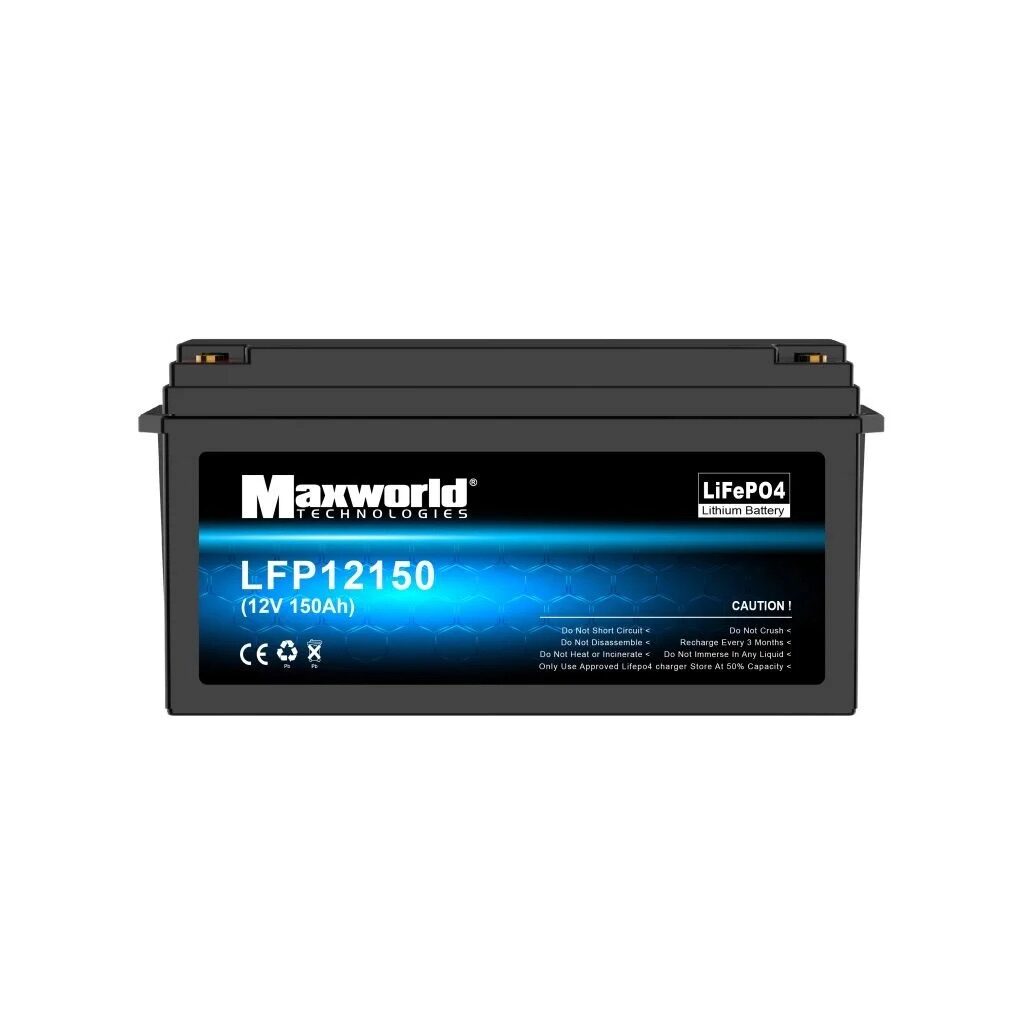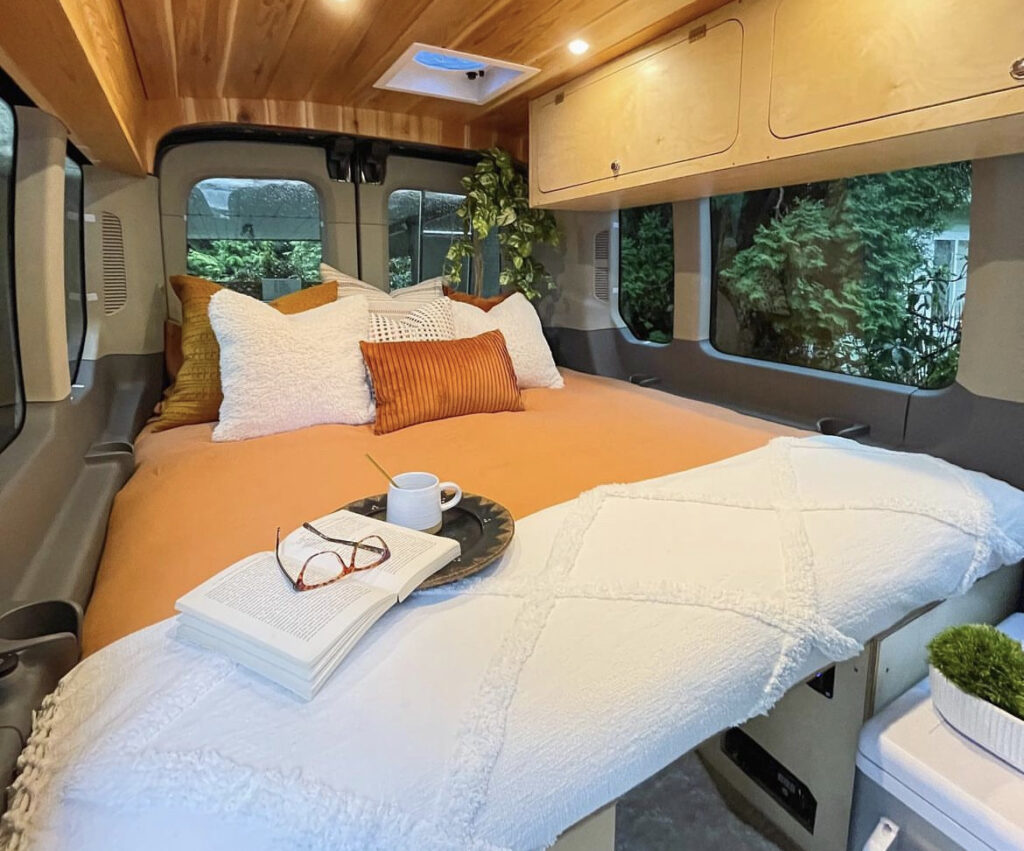Are you planning your ultimate road trip adventure in a camper van? One of the key considerations for your journey is keeping your food fresh and beverages cold. Choosing the right camper van fridge can significantly impact your overall travel experience.
In this guide, we’ll explore things to consider when selecting your camper van fridge and alternative methods to keep your food from spoiling.
Table of Contents

The 3 Types of Campervan Fridges
When choosing a fridge for your campervan, you’ll encounter three main types: the compressor 12V fridge, the absorption fridge, and the thermoelectric coolbox. Each type has advantages and disadvantages, catering to different preferences and needs.
Let’s delve into the pros and cons of each:
1. Compressor 12V Fridge
A compressor 12V refrigerator is the most common type of campervan fridge. They are the most energy-efficient fridge, using a compressor and refrigerant to quickly reach and maintain desired temperatures in the fridge and freezer compartments, drawing low power from the vehicle’s battery.
They come in a chest-style fridge and upright fridges, giving you more flexibility when designing a campervan fridge into your van build.
Pros:
- Efficiency: Compressor fridges are known for their high cooling efficiency, making them ideal for extended journeys. They can quickly reach and maintain low temperatures, even in hot climates.
- Temperature Control: These fridges offer precise dual-zone temperature control, allowing you to set the desired level for the fridge and freezer compartments.
- Low Power Consumption: Compressor fridges are energy-efficient and draw less power than other options, making them suitable for running on your campervan’s battery.
- Rapid Cooling: These fridges can cool down rapidly when you load them with warm items, ensuring your food stays fresh.
Cons:
- Price: Compressor fridges are generally more expensive upfront compared to other options.
- Weight: These fridges tend to be heavier due to the compressor and cooling system, which might impact your campervan’s overall weight.
- Noise: Some compressor fridges can produce a noticeable amount of noise while running, which might be a consideration if you’re sensitive to sounds during your travels.
2. Absorption Fridge
Absorption refrigerators are silent-operating, usually upright fridges that utilize heat and various power sources (such as propane, 12V DC, and 120V AC) to generate cooling, offering versatility but with slightly slower cooling and potentially higher power consumption compared to compressor fridges.
The Dometic Americana is a good example of an absorption fridge freezer. This is a more expensive van life fridge, but they are the most versatile option if you want to use various power sources to keep your food cool.
Pros:
- Silent Operation: Absorption fridges operate silently, making them a great choice for those who value a quiet environment in their campervan.
- Multiple Power Sources: These fridges can run on various power sources, including propane, 12V DC, and 120V AC, providing flexibility in remote locations.
- No Moving Parts: Absorption fridges have no moving parts, which can contribute to their durability and longevity.
Cons:
- Slower Cooling: Absorption fridges take longer to cool down and might struggle in high ambient temperatures.
- Less Cooling Efficiency: They are generally less efficient at cooling than compressor fridges and might struggle to maintain low temperatures in warm weather.
- Power Consumption: Absorption fridges can draw more power than compressor fridges, especially when running on 12V DC.
3. Thermoelectric Coolbox
A thermoelectric coolbox is a portable cooling option for campervans, relying on the Peltier effect to transfer heat and provide cooling. It’s lightweight and suitable for shorter trips but might have limitations in cooling capacity and efficiency compared to other fridge types.
BougeRV has some great options for thermoelectric coolers if you want a step up from a cooler with ice but don’t want to invest in a more expensive compressor fridge for vanlife.
Pros:
- Portability: Thermoelectric coolboxes are lightweight and portable, making them suitable for shorter trips or day outings.
- Low Cost: These coolboxes are typically more affordable than compressor and absorption fridges.
- Easy to Use: Plug the coolbox into a 12V DC power source, and it starts cooling.
Cons:
- Limited Cooling Capacity: Thermoelectric coolboxes are less efficient than the other two types, and their cooling capacity might be limited in warmer conditions.
- Dependent on Ambient Temperature: These coolboxes work by transferring heat, so their effectiveness depends on the surrounding temperature.
- Less Suitable for Long Trips: They might not be suitable for extended journeys where consistent and reliable cooling is required.
Popular 12V Compressor Campervan Fridges
Since the 12-volt compressor fridge for van life is the most popular fridge style, we’ve listed our top three picks below. Keep in mind there are many options out there for other types of camper van fridges.
Best Overall: Dometic CFX3 Series:
Year after year, the Dometic CFX3 series has been voted as the best campervan fridges for van life. Crafted to exceed expectations, this cutting-edge chest fridge redefines portable refrigeration, offering a fusion of advanced technology, convenience, and robust design.
The Dometic CFX3 series offers some dual-zone fridges, a single-zone fridge, and even a zone fridge model with an ice maker.
Best Budget Campervan Fridge: ICECO
For those seeking an affordable yet reliable chest-style fridge for keeping food and drinks fresh on their campervan journeys, ICECO campervan fridges stand out as a budget-friendly choice that doesn’t compromise on quality.
Most Rugged: ARB
These chest-style fridges are engineered in Australia with a legacy of rugged durability and advanced cooling technology. ARB Fridges redefine portable refrigeration, designed to handle the most challenging terrains and climates. These fridges keep your food and beverages cold and fresh, no matter where your journey takes you.

Choosing the Best Vanlife Fridge
When selecting a fridge for your camper van, several factors come into play.
- Size Matters: Camper van fridges come in various sizes, from compact 40-quart units to larger 65-liter ones. Assess your food storage space needs, the size of your van, and the number of people you’re traveling with. Remember that a larger fridge might mean sacrificing space for other essentials. A 40-quart cooler can typically hold two days’ worth of food for two people.
- Power Consumption: A power-efficient fridge is vital for extended journeys. Look for fridges with low power draw, especially if you’re relying on your vehicle’s battery. Compressor fridges are known for their energy efficiency and ability to maintain consistent temperatures even in varying climates. If you use solar power, understand how much power you can generate daily and if it will be sufficient for a 12v refrigerator.
- Freezer Compartment: Some fridges come with a dedicated freezer section, while others have adjustable dual-zone compartments that can switch between freezer and refrigerator temperatures. Consider your need for frozen items and prioritize accordingly.
- Temperature Control: Opt for fridges with precise temperature settings. This is especially important for different types of food and varying weather conditions.
- Durability and Portability: Your fridge will endure bumps, vibrations, and temperature fluctuations on the road. Look for well-built models with quality materials designed for mobility, with sturdy handles and secure latching mechanisms.
- Brand Reputation and Reviews: Research brands with a reputation for producing reliable and high-quality camper van fridges. Reading user reviews can provide insights into real-world performance.
Alternatives to Camper Van Fridges
Van life fridges don’t have to be fancy. If investing in a camper van fridge isn’t in your plans, or you’re seeking backup options, here are a few alternative options that could save money:

Cooler with Ice
Traditional coolers can keep food cold with the help of ice packs or regular ice. While they’re cost-effective, keep in mind that you’ll need to replenish the ice regularly, and melted ice can lead to soggy food.
Plan Non-Refrigerated Meals
Design your meal plan around foods that don’t require refrigeration. Canned goods, dried fruits, nuts, jerky, and certain types of cheese are excellent options. Prepping meals in advance can also help you avoid relying heavily on refrigeration.
Portable Refrigeration Units
Portable electric coolers use thermoelectric technology to keep contents cool. While they’re not as efficient as compressor fridges, they can be a handy alternative.
Dorm Style Fridge
Not recommended, but some people opt for using a regular dorm fridge that runs off 110 power. This is not the best van life fridge since it will take much more power and will require you to install a robust inverter for your power system.

How Cool Will Your Camper Van Fridge Be?
Choosing the right camper van fridge that can be sustained by your power supply and electrical system is an essential part of your travel preparations.
However, if a fridge isn’t feasible for your journey, alternative methods like coolers, insulated containers, and planning non-refrigerated meals can help you keep your culinary adventures on track. Whatever method you choose, a little preparation goes a long way in ensuring your food stays fresh, and your journey remains unforgettable.
Whether you choose an upright refrigerator, a chest-style dual zone fridge, or a basic cooler with ice, go grocery shopping, fill it with all your food, and go Find Your Outside™!


